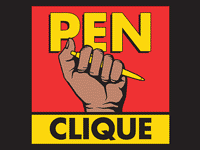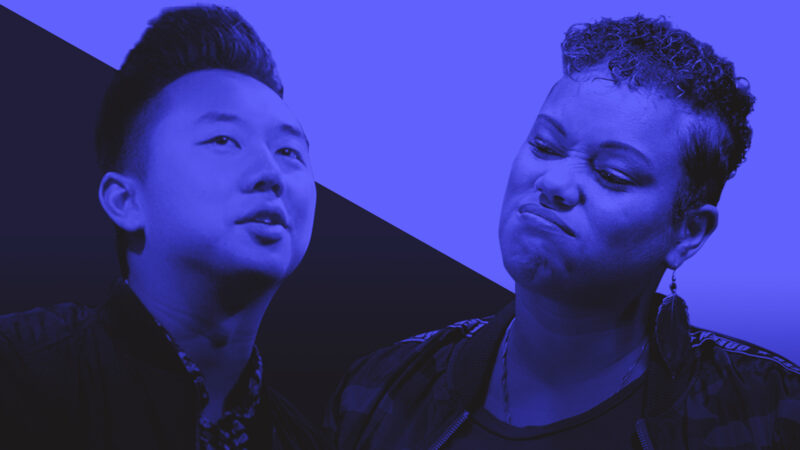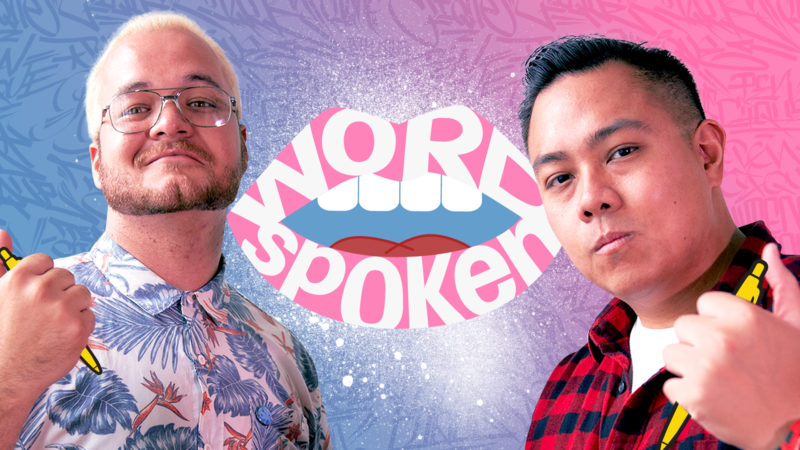[Video Transcript]:
Poetry slam is a spoken word poetry competition, where poets can say whatever they want, however they want, as long as it’s written by the poet, and is read within the time limit. But with an infinite amount of topics to cover, and no set standard to judge by, not only does it make judging slam difficult, but it also makes following slam as a sport way harder than it should be.
This is why we came up with a new format which we call, the Poetry Clash.
I’m Kuya David, one half of the most poppin poetry podcast, the Pen Clique, and in this video we’re gonna re-introduce you to the Poetry Clash, and show how we’re addressing aspects of the slam system that we’re modifying to create a more streamlined, prize-fighting style of poetry competition. Now, I say re-introduce because we actually did this five years ago. It’s how Daniel Hees and I met, we got to building a relationship and that’s how the Pen Clique poetry podcast formed, which would take up all our creative time. But like many of yall that have picked up old projects and hobbies during lockdown, we decided to revisit the Poetry Clash to see if we can do it better this time around, having learned a ton of production skills from doing our podcast and video content.
Poetry Slam: Harder Than It Should Be
Like many spoken word heads, I’m a big fan of battle rap. URL, RBE, King of the Dot, Don’t Flop, even Grime Clashes, I love it all. And I always wondered, how did battle rap grow to be such a worldwide phenomenon, compared to poetry slam, which has existed for almost as long as hip-hop itself? And how is it that battle rap can seem so much easier to follow than a poetry slam?
Well, let’s first look at how a poetry slam is conducted vs a rap battle:
A poetry slam is always a bracket tournament. The smallest slams I’ve seen were 8 people, and the largest individual slams can be up to a hundred people! So imagine you’re judging a poetry slam with 16 poets. You’re watching the first poet go, and they’re pretty good; not the BEST, but really solid, so you give them an 8.5. The next poet you see gives an AWESOME performance, better than the last. You give that poet a 10. Now you’re hyped to see some more 10s, and you watch another poet perform a mad decent piece. Really solid. Not a 10, but a good listen. You give that poet a 9.
But wait, the first poet that had a super solid piece earlier you only gave an 8.5. How come this poet gets a 9? This is the phenomenon in the slam world known as “score creep.” It’s when scores start to rise as the slam progresses, giving an unfair disadvantage to the beginning poets. Slam organizers try to offset this by having a sacrificial poet in the beginning, which might work for small 8-person slams, but for larger ones, it’s difficult to prevent.
In a rap battle however, it’s 1 vs 1. Score creep isn’t even possible because when it’s between you’re comparing two rappers’ content against each other, instead of trying to rate an isolated, individual verse on an imaginary scale out of 10. If you liked what rapper A said more than rapper B, then rapper A won the round, simple as that.
Speaking of 1 vs 1, by shrinking down the competition to be 1 on 1, the narrative gets way simplified for the audience. In a bracket tournament poetry slam, it’s difficult to follow poets when there’s a ton of competitors to listen through. But when it’s 1 on 1, all you have to do is pick a side. This is why fandom for battle rappers is easier to build and follow, because we’re following only one artist in these battles, instead of a whole bracket’s worth.
Lastly, the poems in poetry slam are usually practiced to perfection by performing them at a multitude of open mics, smaller local slams, and at featured performances. The great part is that at a slam, you know this is the best version of the poem you’re probably gonna hear. The problem is, if you travel in the same poetry circles, you might’ve heard this poem a dozen times already and it doesn’t have that same impact as it would have if it were fresh.
In battle rap, unless you’re spitting generic mixtape bars, every verse being heard was specifically tailored and written for their opponent, and will never be heard again unless you rewatch it online. This is what gives rap battles such high replay value, because that battle is the only place you will ever hear those rhymes being performed. It’s guaranteed to be fresh when you watch the battle for the first time.
The Poetry Clash: The Best of both worlds
Inspired by the simplified format of battle rap, as well as recognizing the added value of guaranteed fresh content, the Poetry Clash is a re-tooled poetry competition format, streamlined to allow for easier following, a level playing field for judging, and guaranteed fresh new poems for audiences to experience.
The Poetry Clash is a 1 vs 1 poetry competition. By having only two poets compete against each other, the audience will have direct poems to compare against. But this only works if the poems can be compared.
A weird thing about slam is that the freedom of performing whatever you want means you’ll get to hear intimate stories. The problem in that it can be like comparing apples and oranges. Like if poet A performs a poem about their love life, and then poet B performs a piece about their grandparents dying in a war. Two very difficult things to compare against.
This is why for the Poetry Clash, we’re leveling the playing field by giving poets ahead of time, prompted themes and poetry forms. This means that the poets will be performing fresh, new poems written to the same theme or the same style. By doing so, we take care of a few issues:
- These are freshly written poems specifically for this competition. So you ain’t gonna hear no oldies and reruns on this channel.
- By having the poets write to the same theme, it gives judges better context to compare and contrast the poems against. It’s up to the poets to interpret those themes however they want, but at least it gives the judges a center point they can anchor their voting with.
- By also including poetry forms, we’re challenging the poets to step out of their comfort zone to adapt to different formats that they might not have normally tried out. So you can have a poet that’s super dope at multisyllabic rhyming, but suddenly give them a sestina poetry form and suddenly they won’t be able to rely on the same trick that pushed them through.
This is the poetry clash.
If you’re excited to watch a clash, or think of somebody who would be good on our platform, let us know in the comments and be sure to subscribe so you don’t miss out on any clash announcements and matches. Thank you for watching, and I’ll see you in the ring.
Write-up & Video by Kuya David
You Might also like
-
Poetry Clash: Mic Ting vs Treesje M. Powers
2018 Individual WORLD Poetry Slam champion Michael “Mic” Ting takes on the 10-year poetry veteran Treesje M. Powers. With the rising star of the Bay Area outshine? Or will the lioness of the Inland Empire hold down her crown?
-
Word Spoken Presents: The Pen Clique Season 2 Mixtape
REEEMIX! The good homies across the pond Word Spoken podcast, whom we featured in our last off-season episode, now returns the favor with a Pen Clique SEASON 2 MIXTAPE! This episode features dope moments throughout season 2 that hit you in that special Pen Clique way.
-
Episode 11.5: The Catch Up
While the Clique’s been building a studio and Kuya been out cracking knuckles with IG’s most popping poetry presence, we high-key left the pod audience hanging longer than 2k D’Angelou fans waiting for black messiah. So we back real quick before season two launches in quick catch-up style to let ya’ll know what’s good!



